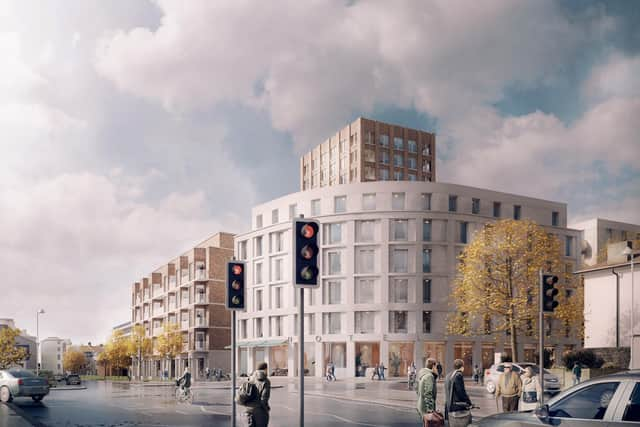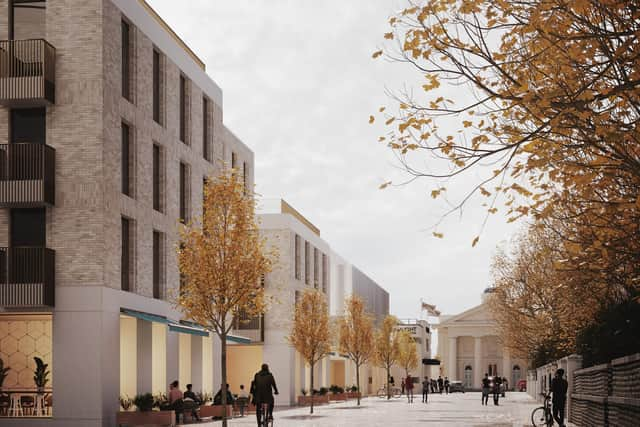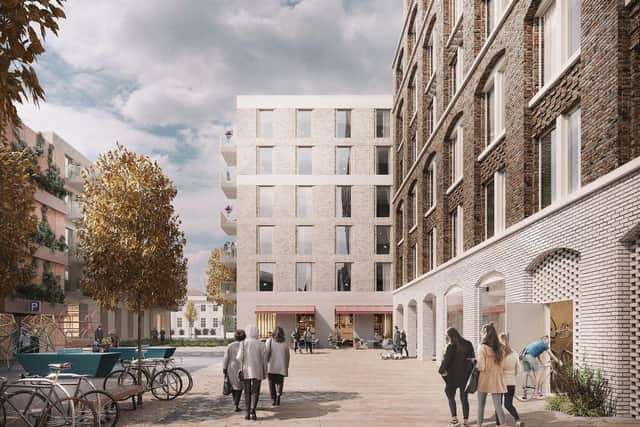Approved Union Place plans ‘will make Worthing an even better place’
and live on Freeview channel 276
At a meeting of the planning committee on Wednesday (November 4), councillors gave a unanimous thumbs-up to the outline application for Union Place.
Much of the site has stood empty for years but it will soon be home to 169 homes, an extension to the Connaught Theatre and Cinema, and a 90-bed hotel, as well as commercial floorspace, car parking and green spaces.
Advertisement
Hide AdAdvertisement
Hide AdPaul High, chairman of the planning committee, said the development would ‘make Worthing an even better place than it is today’.


He added: “We’ve got to support a development on that site. For far too long it’s been a ghost town and it’s not a welcoming sight to people.”
The council acquired the land in 2018 and has been working with government-owned regeneration specialists LCR on the scheme.
A number of changes have been made to the original plan.
As well as reducing the number of homes from 186 to 169, the buildings fronting directly on to Union Place and the High Street have been reduced in height but the tallest residential block reaches 14 storeys at its highest point.


Advertisement
Hide AdAdvertisement
Hide AdThere was some concern from the public about the sheer height of the block.
In a video message to the committee, Haydn Jones described it as ‘monolithic’ and added: “The recent race to be the tallest coastal town is in danger of spoiling Worthing.”
Susan Belton, chair of the Worthing Society, called the design ‘oppressive’ and said the society had ‘serious concerns about the suitability of the design’.
She asked for the plans to be paused for a complete redesign ‘which Worthing can be justly proud of both now and in the future’.


Advertisement
Hide AdAdvertisement
Hide AdThat was never likely to happen, though, especially as the committee was told there had been 18 versions of the design in the four years of its development.
As an outline application, the committee was only giving its approval to the concept of the plan and any access issues.
The design details will return to them at a later date.
One change they did insist on, though, following an appeal from Martin McCabe (Lib Dem, Tarring), was the inclusion of a Changing Places toilet within the development.
The toilets include a hoist and bench and are designed for people with profound and multiple learning disabilities, motor neurone disease, multiple sclerosis, cerebral palsy, as well as older people.
Advertisement
Hide AdAdvertisement
Hide AdAfter the meeting, Kevin Jenkins, the council’s executive member for regeneration, said: “I’m delighted that this proposal in principle has received the backing of the planning committee and want to thank the team from LCR and our own officers for bringing an ambitious and deliverable scheme forward.
“Union Place is an important town centre site that has been left undeveloped for a number of years, which has had a negative impact both visually and economically on the vitality of our local economy.
“Bringing it back into use is a key part of our ambitious town centre renewal programme, which has become even more important due to Covid.
“The proposal creates a range of much-needed housing; supports tourism, through a new hotel; will create a more vibrant cultural scene, with the proposed addition of new cinema screens; and offers flexible commercial space and connectivity to the wider town centre which will support the local economy for years to come.”
Advertisement
Hide AdAdvertisement
Hide AdRay Willis, regional director for LCR in the South, said: “We’re pleased to be supporting the council’s ambition in bringing this key site back into productive use. It has been made possible by leveraging the council’s unrivalled knowledge of the needs of its community, coupled with our experience in developing complex sites. The project is set to deliver vital new homes, jobs and public value for Worthing.
“Regenerating underused and underdeveloped land in our town and city centres has always been key to maintaining thriving communities, but it’s now more important than ever as Britain looks to navigate an economic recovery from the impact of Covid-19. This is a key example of the kind of project that local authorities should champion in order to generate strong growth across our regional hubs.”